type
status
slug
summary
tags
category
icon
password
ID
date
Author
URL
However, the word stings wage earners because it accurately describes an almost inescapable part of East Asian wage earners' life-the subway.
Chinese people are often proud of their infrastructure. In Beijing and Shanghai, you can see large-scale subway lines, which is necessary for these two fast-paced metropolises: if you rely entirely on road traffic, traffic jams can paralyze the city during the working and off hours of the city. For a giant city like Beijing, even without considering traffic jams, the speed and price of the subway are one of the preferred modes of transportation for ordinary people to go out.
However, some people disagree with such a good subway.
On Weibo, China’s famous social networking site, a female screenwriter named Zhang Xiaohan complained about the inconvenience caused by the torrential rain on Aug. 10, 2019. One paragraph on Weibo said that she was used to a comfortable life, “can smell the subway station on other people” and should no longer feel uncomfortable because of the heavy rain.
Coincidentally, in the Oscar-winning South Korean movie Parasite, the rich male host once mentioned that the poor smelled of “subway stations”. Although the male host did not say it in public, this sentence still deeply hurt the heart of the poor protagonist’s family.
The highly regarded female screenwriter on Weibo was of course ridiculed by netizens. Scientifically, it may be difficult to accurately demonstrate what is meant by “subway station smell”. More often, we regard this vague description as a bad joke, a kind of disdain for ordinary wage earners by the rich. However, the word stings wage earners because it accurately describes an almost inescapable part of East Asian wage earners’ life-the subway.
Just Relax! Subway is a complex system, it is necessary to discuss the technology, system, and business model of Chinese subway. It’s even more complicated and boring. A simple fact is that the subway is very useful, and on the whole, it is a very good model of transportation, otherwise, so many people would not have chosen it. On this basis, let’s talk briefly about why the subway is still a little unpleasant, especially for wage earners.
Feel the huge Beijing
Similar to Shanghai, Beijing has dense subway lines and many stations. Through the subway, you can easily pass through most of the major areas of Beijing… Wait a minute, what is “Beijing”?
Open the map of China and you can easily find a municipality directly under the Central Government called Beijing. Although this municipality is only a municipal administrative unit, its area is much larger than that of Shanghai, the same big city, and can already be regarded as a mini provincial unit. Beijing has such a large area, is it a few super cities made up of Shanghai? And be not so. Although Beijing has a large area, it is Beijing in an administrative sense; in terms of cultural concept, Beijing is much smaller than Beijing on the map.
The most objective view is that in a narrow sense, Beijing has only “urban eight districts”: Dongcheng District, Xicheng District, Chongwen District, Xuanwu District, Haidian District, Chaoyang District, Fengtai District, and Shijingshan District. Since 2010, the administrative division has changed, and Chongwen District and Xuanwu District have been merged into Dongcheng District and Xicheng District, so the old concept of “City eight districts” has become a new concept of “City six districts”.
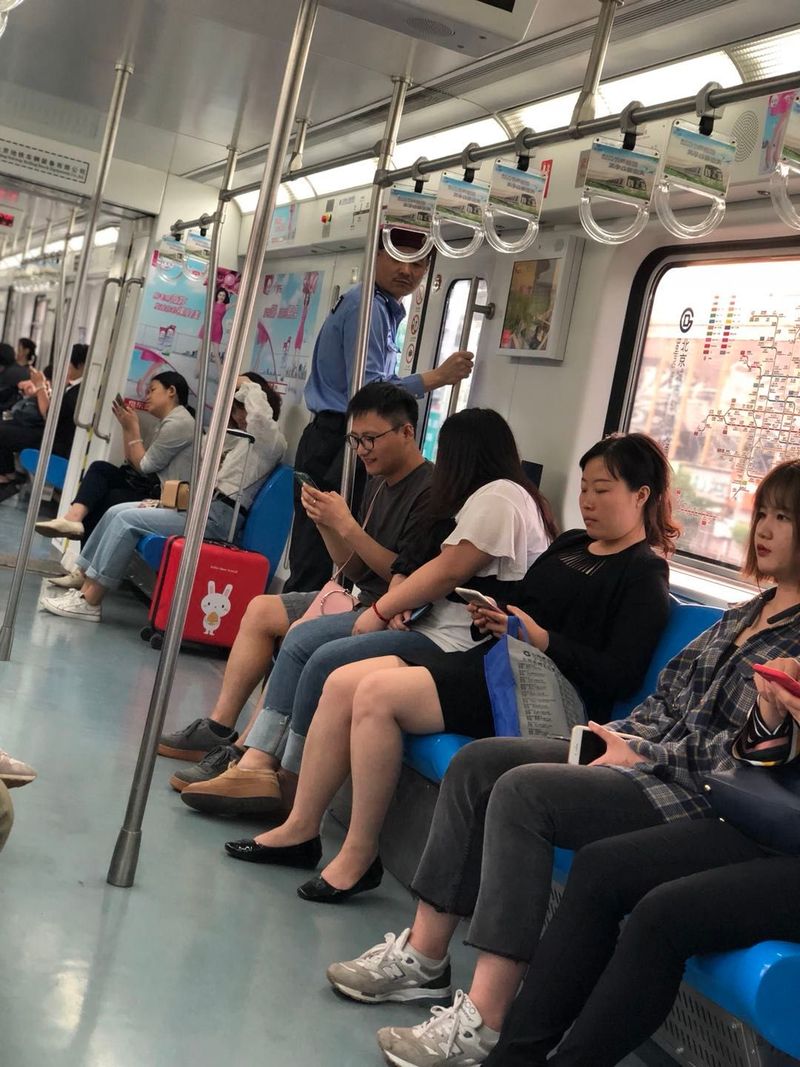
typical Beijing subway style
Generally speaking, the sixth District of the City is regarded by most Chinese as Beijing in the real sense. What does this mean? The area of Beijing is 16410 square kilometers, while the area of the six districts of the city is only 1381 square kilometers, which is less than 1/10 of that of Beijing. In other parts of Beijing, there is a lot of agricultural lands, the population density is also quite low, it does not look like a big city. The house price in the sixth district of Beijing is very high, but outside the sixth district of Beijing, it is much cheaper.
In a narrower sense, some people who have lived in Beijing for generations will say that only Dongcheng District, Xicheng District, Chongwen District, and Xuanwu District are narrowly Beijing. In other words, after 2010, only Dongcheng District and Xicheng District are regarded as Beijing in the eyes of old Beijingers, while the combined area of these two urban areas is only 93 square kilometers. Of course, few people will agree with this Beijing concept. “only Dongcheng District and Xicheng District is Beijing” is usually regarded as a joke. However, the housing prices in Dongcheng District and Xicheng District are not jokes, and it is no exaggeration to say that children in these two urban areas are born with amazing wealth.
Let’s get back to business. The planning of the Beijing subway was 40 years ago. At that time, only Dongcheng District and Xicheng District were more prosperous in Beijing, and the subway planning only took care of the future development of City six districts– at that time, City eight districts– but did not expect that today’s Beijing, its population and industrial and commercial scope are constantly expanding, even beyond the limitations of City six districts.
For example, many outsiders who go to work and live in Beijing cannot afford the high rent in the six districts of Beijing, so they can only choose to live in relatively remote communities such as Huilongguan and Tiantongyuan, which are not within the six districts of Beijing. Note that because of the gap in the urban areas, few people need to live in such remote communities in the bustling cities of Shanghai and Shenzhen. As a result, Shanghai and Shenzhen, which are also big cities, have a significantly better experience of taking the subway than Beijing.
In this case, although they can still use the subway to travel between rental housing and the company located in the sixth district of the city, the choice of subway lines is very limited. Moreover, from the rental house to the nearest subway station, they are likely to take a few bus stops or walk a considerable distance. This cannot be compared with the convenience of residents in the narrow sense of Beijing to take the subway.
Of course, the most frightening thing is the commuting mileage between “Sleeping City” and downtown Beijing. Considering the congestion of Beijing’s ground traffic in the morning and evening peak hours, although the speed of the subway is much faster than the ground public transport, the absolute mileage from the edge of Beijing to the center can be as long as tens of kilometers. Coupled with station stops and line transfers, there are quite a lot of wage earners in Beijing who travel for one to two hours and commute for as long as three to four hours a day.
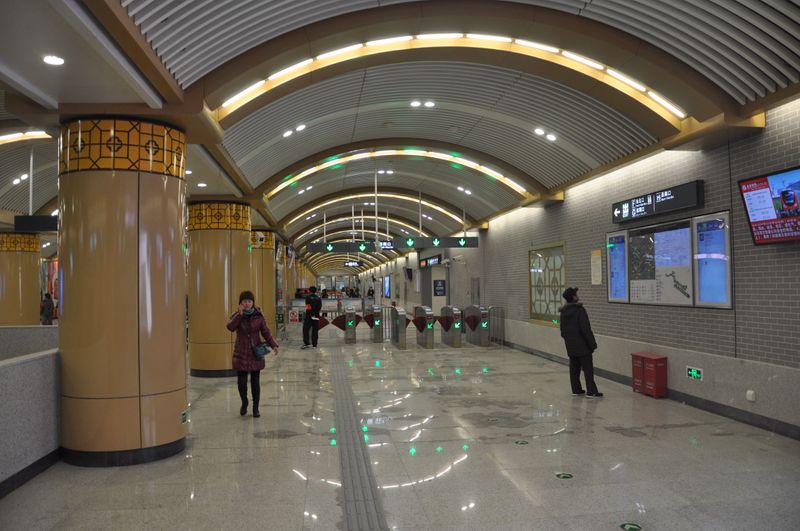
Subway stations in China are usually neat and tidy.
To be fair, although the subway stations and carriages in Beijing are not very trendy and luxurious, they are well maintained, clean, and tidy. So, is it comfortable to stay on such a subway for three to four hours?
Fatigue multiplied by population multiplied by the quality
If you know how many people there are in Beijing, you won’t think it would be a pleasure to take the Beijing subway during the rush hour. Beijing has more than 21 million permanent residents, but their distribution is uneven. Every morning, millions of people take the subway from the edge of Beijing to the heartland to work, and when they focus on the few subway lines, you can imagine what subway stations and carriages look like.
The subway in Tokyo, Japan is considered to be the most crowded in the world. The Beijing subway is not as scary as the Tokyo subway at most stations and most of the time, but a few “Sleeping City” stations and transfer stations during the rush hour are even worse than Tokyo. According to the Beijing Metro Corporation, Beijing’s subway usually carries an average of 12 million passengers a day, up from more than 10 million even during the COVID-19 epidemic. The Beijing subway is not as densely packed with lines and many stations as the Tokyo subway. When a large number of “Sleeping City” residents are concentrated on one line, such as Huilongguan residents and Tiantongyuan residents, the subway has completely become a world which follows the rules of jungle.
I used to spend a night at a friend’s house in Changping District. After getting up early the next day, without any psychological preparation, I embarked on the way home on the subway back to the city. As a result, I waited for three trains in a row on the platform but failed to board any of them– because there were so many passengers on the platform that all order and plans came to naught, and you had to follow the crowd and move firmly, neither hesitating nor impatient, so as to find an opportunity to step into the subway when the crowd pushed you towards the subway door– provided there was room in the subway compartment. And this in itself is an extravagant request.
You may wonder why these passengers are so uncivilized, do not know how to wait in line, and do not know how to be courteous. But when they go to bed late and get up early every day, rub their sleepy eyes on the crowded subway, and spend three to four hours commuting to and from two points in the huge city of Beijing, when the salary for their hard work is not even enough for them to pay the rent in the heart of the city, they have devoted all their energies to maintaining this hard life and can no longer pay more to maintain an illusory civilization of what to do.
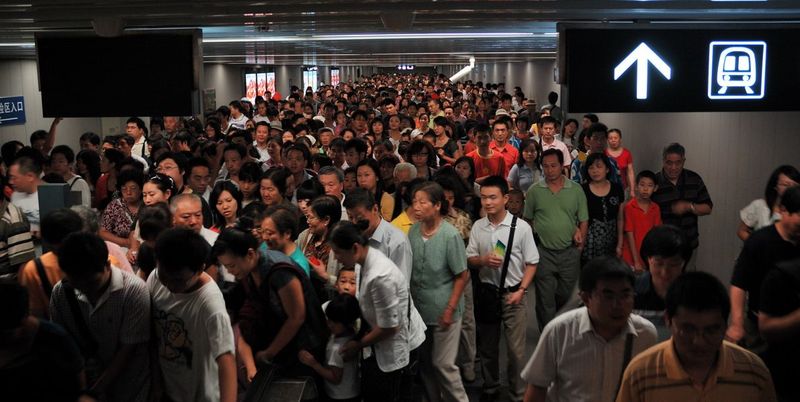
More, unfortunately, even if someone is willing to maintain order, in the crowded crowd, a small number of saboteurs will destroy everything. The people’s Republic of China is a country that has been founded for only 70 years, and the first 30 years have been spent in poverty and chaos. Chinese people born before the 1980s generally do not have a very adequate education. Little is known about the norms of urban civilization. Although the fresh labor force living in “Sleeping City” in Beijing is younger, a small number of middle-aged and elderly people will still make a mess of order. How can we ask these people who do not understand the rules to abide by the rules?
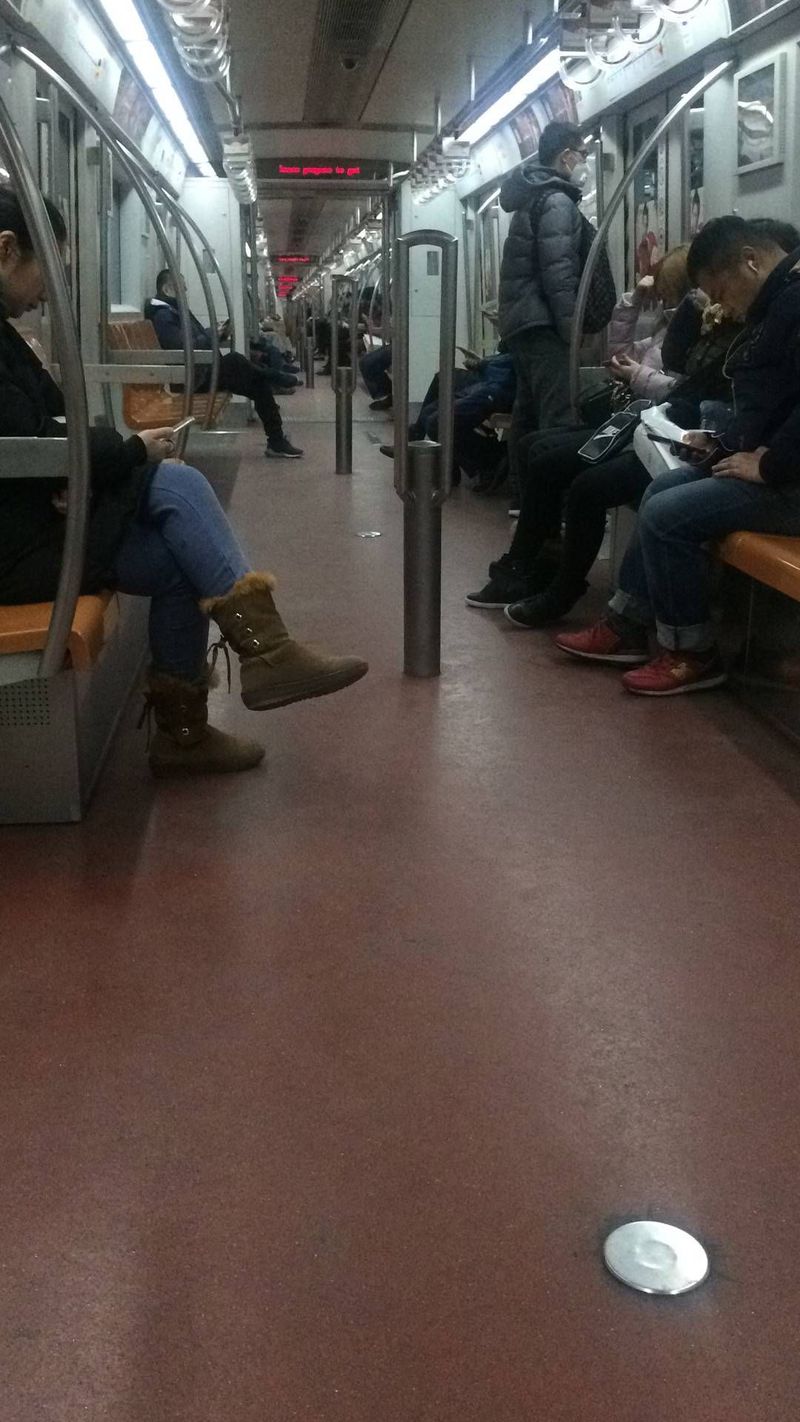
Subway passengers usually look down at their mobile phones.
It is undeniable that there are also some well-educated young people who ignore order for their own convenience and comfort. Although most people scoff at these people, no one has the opportunity and patience to educate or teach them during the busy morning rush hour. When individuals form a large group, the individual’s yearning for the order will seem ridiculous and submerged in the surging flow of people-at least on the subway.
If you are not taking these particularly crowded lines, the situation may be better. The huge flow of people will still force subway stations to increase flow restrictions, such as closing convenient passageways to force people to bypass longer ones and reduce the pressure on subway platforms. But everything is in order, and although the flow of people is slow and there are still so many passengers waiting on the platform that you need to wait for a few more trains, at least you won’t feel the physical impact of the Sleeping City subway. In addition, when you get into the carriage, you can stand on your feet-and on the “Sleeping City” route in the morning rush hour, you may be crowded with your feet in the air and your backpack crooked, so you’d better not carry anything fragile in your bag, trust me.
If it is in the off-peak hours, then these congestion problems do not exist. At this time, what the Beijing subway will make you feel uncomfortable, is mainly those passengers who do not abide by the rules, such as those who jumping the queue or grabing seats. In addition, a few transfer stations maybe a little too far away to walk, especially when old subway lines meet with new ones, and the design of transfer stations is often a little annoying.
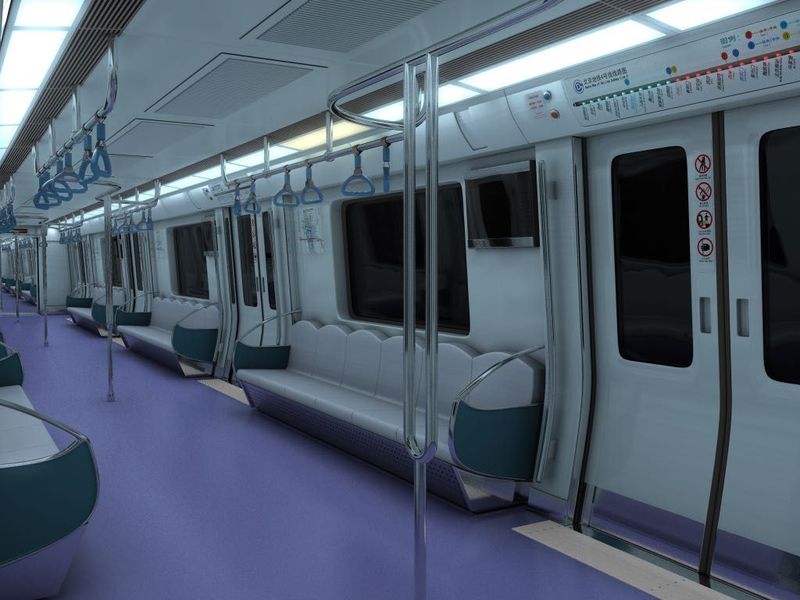
The subway will be very empty at night.
In addition, some subway cars may rub violently while driving, making an unpleasant noise. Please rest assured that there are very few safety failures in the Beijing subway. If the friction of the car is unbearable, you can change the car or walk to a place far away from the connection. Or you can, like a student or office worker, wear headphones to block out the noise in the noisy Beijing subway, this is not just about isolating the noise from the carriages.
[sociallocker id=”5614″]
If you are from an European country, you may feel uncomfortable with the strict security check of the Beijing subway. But please understand that under all kinds of strict inspections, Beijing is one of the safest cities in the world. You don’t have to worry about vicious public safety incidents such as terrorist attacks on the subway. In fact, this has never happened on the Beijing subway.
Please take a taxi
I once took the subway in Beijing with a professor from a British university, who mocked himself about the experience, calling it an “experience of life”. There is no doubt that Beijing is a city with a fast pace of life, and the subway, which represents the main way for wage earners to commute, can be said to be one of the most concrete manifestations of the city’s high-speed operation. In the subway, you can really see the faces of most ordinary people in Beijing. Maybe you can smell the “subway station” when you get used to it.
When it comes to taste, there used to be some passengers in Beijing who would eat in the subway, sometimes even some food with a strong taste. The regulations vary from place to place, and Beijing has not banned passengers from eating and drinking in subway cars, but since 2019, the subway has issued a ban on eating and drinking in the carriages, and staff will dissuade those passengers who do not obey the rules. The problem similar to eating and drinking is begging. Many beggars used to take the subway and beg back and forth in the carriages, but after strengthening management, this phenomenon has become rare-because their begging tools, such as radios, are often found during security checks.
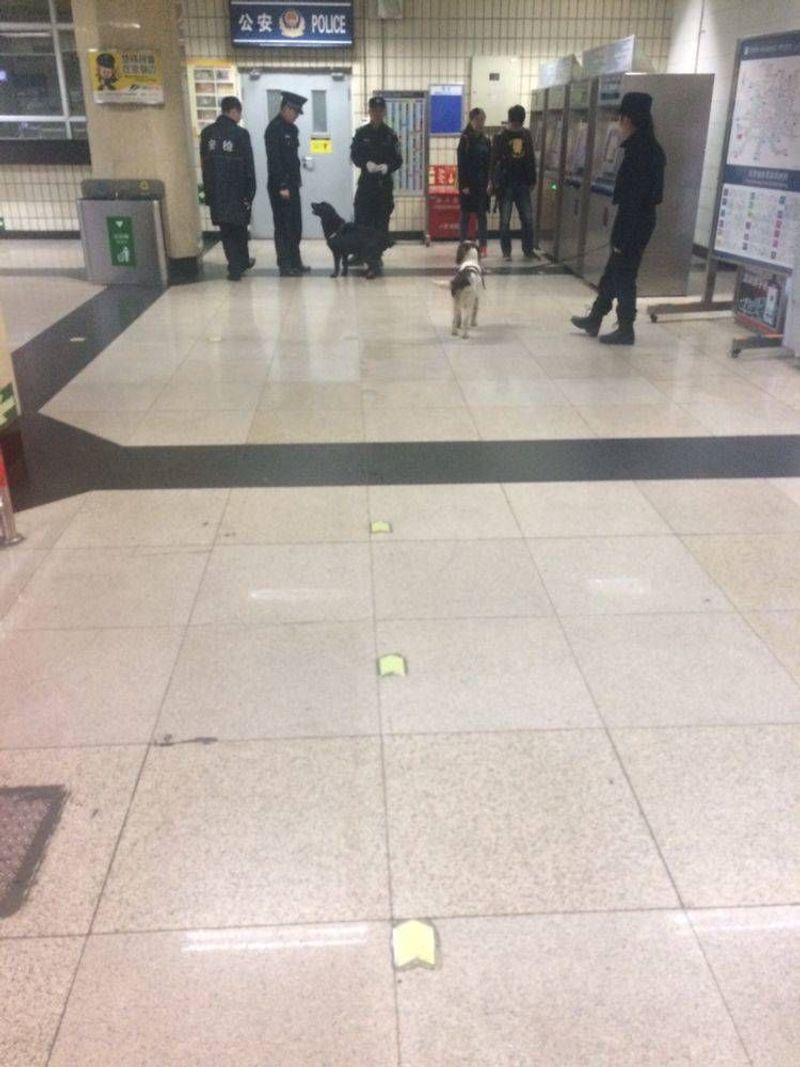
strict security check
If you really come to Beijing, I suggest you choose a taxi when you travel. On one hand, China’s ride-hailing is very developed, you only need a mobile phone with Internet access and install mainstream ride-hailing softwares, you can travel freely in Beijing. On the other hand, compared with developed countries, taxi fares in China can be said to be very cheap. If you are a tourist who comes to see the cultural relics and monuments in Beijing, the taxi fare must not be much burden on you– don’t think of China as Japan. Taxi fares in Japan are more than ten times more expensive than in Beijing.
Are you curious about the price of the Beijing subway? Beijing subway is priced according to mileage, and the fare is as low as 3 yuan. According to the increase in mileage, a one-way ticket of 6 yuan is generally enough for you to travel to Beijing, and further mileage will not make the fare too expensive. But with the exception of the airport line, the Beijing Metro Airport Line will charge you a ticket price of 25 yuan when it goes to and from the airport terminal. Considering the mileage of the airport line, it is about 20 kilometers from Sanyuanqiao to the two terminals, which is not expensive.
On the other hand, the ground public transport in Beijing will be cheaper than the subway. But in any case, if your Chinese proficiency is limited, I really do not recommend that you take public transport in Beijing. If you are unfortunately caught in a traffic jam in Beijing or run into a rush-hour flow of people, you can quickly deepen your understanding of Beijing-it’s not that interesting, don’t you think?
[/sociallocker]
- Author:NotionNext
- URL:https://pandayoo.com/2020/07/24/is-the-beijing-subway-really-crowded
- Copyright:All articles in this blog, except for special statements, adopt BY-NC-SA agreement. Please indicate the source!